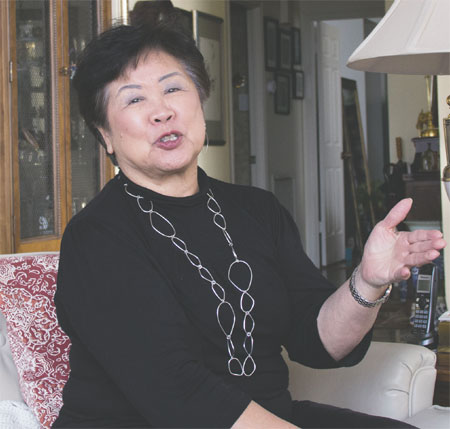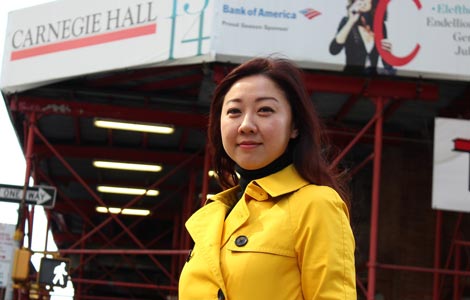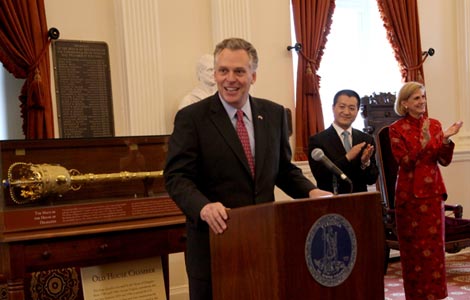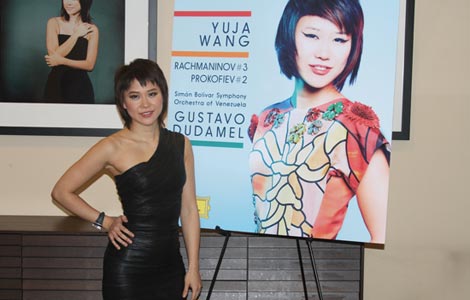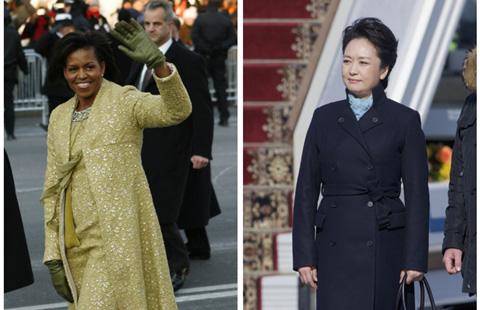Martha Wong: She made history in Texas
Updated: 2014-03-21 13:15
By May Zhou in Houston (China Daily USA)
|
||||||||

|
Martha Wong talks about her life at home. May Zhou / China Daily |
Martha Wong has won two prominent "firsts" among her many achievements in the Texas political scene.
In 1993 Wong became the first Asian American elected to the Houston City Council. She served three full terms from 1994 to 2000.
In 2002 Wong beat a 22-year incumbent and became the first Asian-American woman elected to the Texas State Legislature, serving from 2003 to 2007.
Martha Wong's story, from encountering segregation in her childhood to her political victories, is representative of not only her determination to succeed, but also how Chinese and Asian Americans have fought for their rights and how much they have achieved.
"My father came to the US back in the 1920s with his father as a little boy for the Gold Rush and helped to build the railroad in California," Wong said. "When my father was a teenager he was sent back to China to learn Chinese because he did not speak Chinese. Four, five years later, he got married there and brought my mother over."
Eventually Wong's parents settled in Mississippi because the state needed workers in cotton fields. "It was such hard work that my parents decided to run a grocery store to serve the black people because the blacks could not go to the white grocery stores," she said.
A few years later, when Wong's older sister reached school age, her parents found out that she was barred from the white school in segregated Mississippi and the black school was in very bad shape. In 1938 Wong's parents moved to Houston so their first child could go to a decent white school. Martha Wong was born the next year.
At that time Houston did not bar Asians from a white school, but did so in housing and Wong's father could not rent an apartment in a white neighborhood. The family first had to live with some friends, and later on with friends' help, Wong's father managed to rent a grocery store in Houston's Heights area. In the 1940s, Heights was a white neighborhood of blue collar families, and they could not rent or buy a place there.
"So we had to live in the back of the store," Wong said. "It was just an empty space with two beds and one table. At dinner time, my father sat in the only chair and the rest of us sat on apple crates. We lived there for six years after I was born."
Finally, a customer of Wong's father sold his house to him when Wong was in first grade and the family had a home of their own in Houston, right across from their grocery store.

Wong grew up helping her parents in the store by doing various chores, and she met her future husband at the first Chinese Baptist Church when she was in high school. They went to the University of Texas together, graduated and got married. After graduation Wong had her first baby while working as a teacher, and after a third baby, she stayed home for 10 years to raise them.
In 1972 when the youngest child started kindergarten, Wong returned to teaching, and gradually worked her way up to be a principal. When her oldest child was about to enter college, Wong's husband died of a stroke, and she has not remarried.
While raising three children with her parents' help, Wong quit her job and went to college for a PhD. "My youngest kid was in high school when the other three of us were going to college and we hardly saw each other for a while because we were in different schools. It was hard, but we managed."
Wong got her PhD in 1983 and then held various positions such as associate superintendent in the Houston Independent School District, associate professor at Baylor College and director at the Houston Community College.
It was during this time that Wong got involved in politics, first by helping her district council candidate win an election. Her strong campaign effort earned her a reputation and others who sought elected office sought her help and endorsement.
"Eventually a group of us decided to run our own Asian candidate for the city council instead of just supporting others; so we formed the Asian American Coalition (AAC). At first AAC decided to run an Asian male, but two times in a row an Asian woman came out to run and the AAC candidate dropped out so they would not run against each other."
In 1993, when the city council seat in Wong's district became vacant, the AAC decided to have her run. She won with 62 percent of the vote to represent a district that includes the affluent River Oaks neighborhood, which until 1972 excluded home ownership by non-whites like Wong.
During her six years on the city council, Wong helped local Asian Americans advance in various civic and governmental organizations.
With her backing, many important Houston city boards appointed Asian Americans for the first time, including the metro board, the planning board and the sports authority.
Wong also successfully pushed for the appointments of Asians as Houston's first assistant police chief and first deputy director of public works. She also helped another Asian American, Gordon Guan, get elected to the city council in his first campaign.
In addition to helping Asian Americans, Wong also has helped the community at large. As a city council member, she assisted seven companies in acquiring tax abatements (one of the city's economic development tools); worked to develop three tax reinvestment zones; established two neighborhood improvement associations; worked with commercial retail development companies to refurbish four shopping centers; and helped two national retail businesses to locate their businesses in the Houston area,
Wong completed her final term on the city council in 2000. Two years later she defeated a longtime incumbent and became the first Asian-American woman elected to the state legislature from 2003 to 2007.
As a freshman legislator she successfully pushed more than 10 bills, including a tort reform bill that she is especially proud of.
In 2007 Wong lost her seat to an opponent with strong financial backing. She then dedicated herself to being an active community volunteer and political adviser.
Last year, Wong and other Asian community leaders created the Texas Republican Assembly (TARA), an auxiliary of the state's Republican Party with Wong serving as its first president.
Through TARA, Wong said she wants to utilize her political experience to achieve several goals, including educating Asians about politics, and, more importantly, she wants TARA to serve as the platform for governmental officials to talk to the Asian community.
Another major mission of TARA is to identify potential Texas Asian Americans who want to run for office, Wong said.
"We are finding young people who are interested in politics and we want to help them find internships, opportunities for campaign volunteering and government positions. We try to help them to build a resume and a base ready to run for office," she said.
Wong and TARA are helping Houston's Alief Independent School District trustee Nghi Ho and San Antonio City Council member Elisa Chan to run for seats in the Texas Legislature by soliciting support and helping with their campaigns.
mayzhou@chinadailyusa.com
(China Daily USA 03/21/2014 page11)
Most Viewed
Editor's Picks

|

|

|

|

|

|
Today's Top News
Michelle Obama meets with students in Beijing
Alibaba buys stake in Silicon Valley
A long musical journey to Carnegie Hall
Issuing 'dim sum' boosts China ties
Cathay Pacific adds HK-NJ flights
Michelle Obama starts landmark trip
Australia resumes search for MH370
Russia starts sanction on US
US Weekly

|

|
